I am using a query to select data from sql database. It has rows but data raader.Read() function returns false and rows are empty as I have checked in debugging
Code that i have been using is
public void getSale()
{
DB db = new DB();
try
{
db.cmd.CommandText = "select * from Sale where date is not null and (date between '"+StartDate+"' and '"+EndDate+"') order by date";
db.cmd.Connection = db.con;
db.con.Open();
if(db.con.State == System.Data.ConnectionState.Open)
{
db.dataReader = db.cmd.ExecuteReader();
if(db.dataReader.HasRows)
{
while(db.dataReader.Read())
{
SaleModel sm = new SaleModel();
sm.SaleId = long.Parse(db.dataReader["Id"].ToString());
sm.UserName = db.dataReader["UserName"].ToString();
sm.ItemsQuantity = int.Parse(db.dataReader["ItemsQuantity"].ToString());
sm.TotalAmount = double.Parse(db.dataReader["TotalAmount"].ToString());
sm.SubTotal = double.Parse(db.dataReader["SubTotal"].ToString());
sm.Discount = double.Parse(db.dataReader["Discount"].ToString());
sm.Completed = bool.Parse(db.dataReader["Completed"].ToString());
sm.Date = DateTime.Parse(db.dataReader["Date"].ToString());
sm.CustomerPhone = long.Parse(db.dataReader["CustomerPhone"].ToString());
SalesList.Add(sm);
}
db.con.Close();
}
}
}
catch(Exception ex)
{
MessageBox.Show(ex.Message, "Exception", MessageBoxButton.OK, MessageBoxImage.Error, MessageBoxResult.OK);
}
}
And When I tested this query on Query editor in Visual studio rows were returned 
If Anyone can help?
